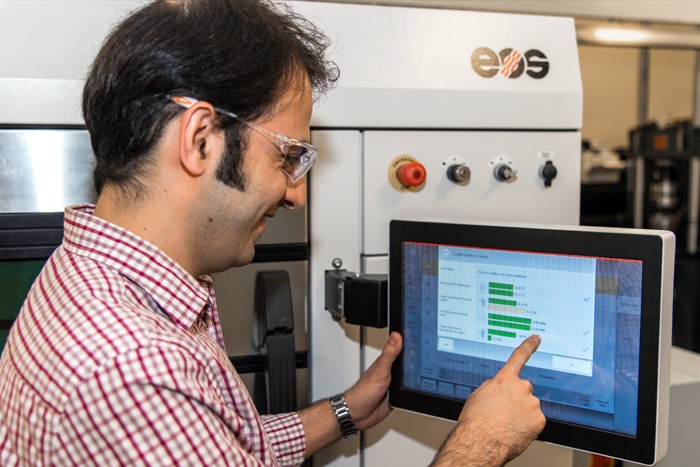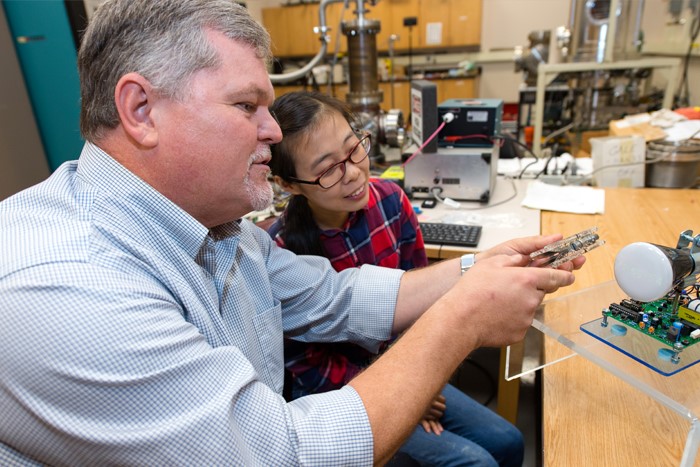

Nima Shamsaei and Scott Thompson, associate professors of mechanical engineering like to think — and print three dimensionally.
As the co-directors of the Laboratory for Fatigue and Additive Manufacturing Excellence, they are eager to showcase the capabilities of additive manufacturing, and the impact it could have on changing the future of many industries.

Both Shamsaei and Thompson use the FAME lab to specialize in mechanical fatigue and failure analysis. After fabricating components on a 3-D printer, the laboratory staff can evaluate their integrity on various fatigue-testing machines. Their testing and research is pushing the development of 3-D manufacturing of custom parts once thought not printable, from lasers and metal powder. Shamsaei and Thompson are passionate about expressing the importance of characterizing, understanding and designing for the structural integrity of additively manufactured components.
“It is essential to understand and improve the mechanical performance of additive products. In doing so, we can overcome a major barrier against the widespread adoption of this technology,” Shamsaei said. “In terms of durability and reliability of these products, we have to ask if we trust them enough to put them in an airplane or in a human body. Can they be reliable for their intended applications? That’s the focus of our research.”
The lab’s expertise in both additive manufacturing, as well as fatigue characterization, has proven to be a major attraction to funding agencies and industry partners. Shamsaei and Thompson have led, and continue to lead, additive manufacturing projects sponsored by the U.S. Army, Navy, NASA and private industry, totaling more than $2 million in extramural research expenditures during the past two years. They were also awarded $300,000 in funding from the National Science Foundation to investigate their project, “Additive Manufacturing of Fatigue Resistant Materials.”
Their research and partnerships have enabled them to evaluate the additive manufacturing process and determine how to streamline it for a company’s benefit. But that doesn’t come without its challenges.
The most difficult aspect of additive manufacturing is developing the “magical formula” so any part that is printed will work effectively, efficiently and over an extended period of time, according to Thompson.
“Printing a metallic, table-topper sculpture is easy, but consistently manufacturing defect-free, load-bearing parts certifiable for biomedical and aerospace industries is a different story,” Thompson said. “Even one defect in a printed metallic part can prove catastrophic during application. In the FAME lab, we are discovering new ways to predict defect formation and determining how process parameters impact final structural properties.”
Speaking of impact, the FAME lab is already making one with 10 doctoral students working under the direction of Shamsaei and Thompson, and they’re now recruiting undergraduate students. The goal, Thompson says, is to expose students early on in the additive manufacturing process and enable them to develop those skills so they can become the knowledge experts companies are currently seeking.
Thompson and Shamsaei’s goal is to create a “make and break” lab that encourages students to test and develop 3-D printed parts that could change the way companies mass produce anything from an airplane part to a biomedical implant. If they can achieve that level of excellence in their students, then they know they are capable of rising to industry challenges.
“We want to have the most successful graduates from our lab and go on to be the future scientists and engineers who make a difference in industrial sectors and national laboratories,” Shamsaei said.
To learn more about Shamsaei’s and Thompson’s 3-D printing research, please visit the FAME lab website: http://www.fame.auburn.edu/.

